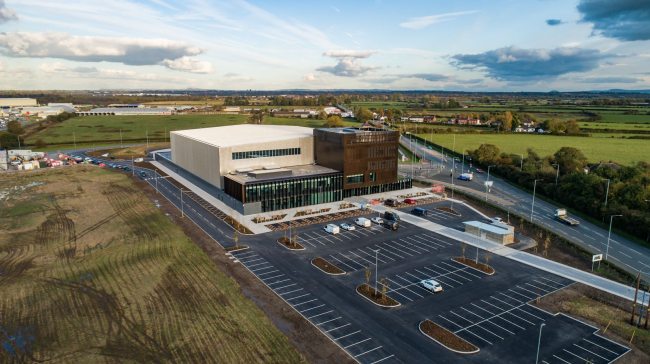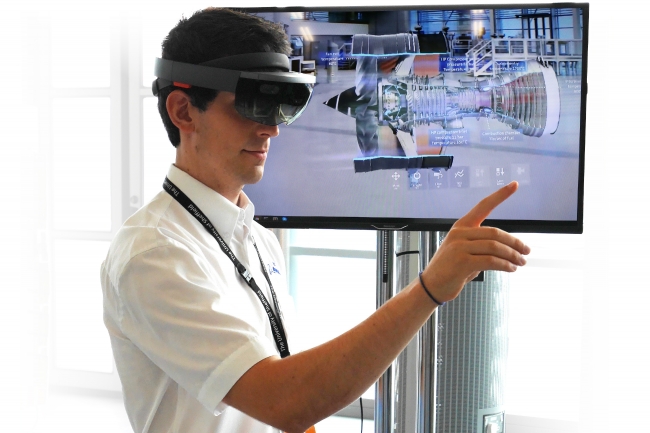5 minute read
AMRC rises to the ventilator challenge
Futuristic headsets programmed to enable skilled aerospace and automotive production line operatives to rapidly switch to the manufacture of 10,000 life-saving medical ventilators were rushed from the AMRC in Rotherham to sites across the UK last week. At the same time, its recently opened R&D facility in North Wales was also turned into a production facility for the devices.
The augmented reality equipment is critical to the success of a powerful industrial consortium which has come together to accelerate the production of thousands of ventilators before the Covid-19 pandemic reaches its peak.
The industrial consortium, Ventilator Challenge UK, came together after the Prime Minister, Boris Johnson, made a plea for an additional 50,000 ventilators to be delivered to the NHS within a matter of weeks.

The AMRC R&D facility in North Wales was turned into a production facility for the devices / Picture: AMRC
Under the leadership of the High Value Manufacturing (HVM) Catapult, the AMRC and the Nuclear AMRC, are at the heart of a multi-faceted campaign to deliver the additional ventilators, the first of which will be coming off production lines around the UK as early as next week, according to the Chancellor of the Duchy of Lancaster, Michael Gove. The consortium is focusing production on two existing ventilator designs which meet the high-level specification for a Rapidly Manufactured Ventilator System (RMVS) developed by clinicians and the Medicines and Healthcare products Regulatory Agency (MHRA).
Dick Elsy, chief executive of the HVM Catapult, said: “What we are seeing here is a truly collaborative, international effort, with the best and brightest engineering and manufacturing brains coming together to rally all their resources in response to the distress signal from the NHS.”
Within hours of the Prime Minister laying down his ventilator challenge, the AMRC and Nuclear AMRC were taking scores of requests for assistance, not just for ventilators, but also for medical equipment such as face masks and swabs and vials for Covid-19 test kits. To make sense of this, the Nuclear AMRC generated a communications log to streamline the most appropriate support by identifying those with the capability to best produce key products and sub-level components.
Professor Steve Jones, chief technology officer at the Nuclear AMRC, said: “This information was refined and characterised to fit with the government’s prescribed classification criteria. In the two weeks following the challenge, the Nuclear AMRC registered over 90 enquiries. These were then filtered to produce a focused and directly tangible suite of proposals to assess support from both within the Nuclear AMRC, the AMRC, our stakeholder community and the Fit for Nuclear supply-chain network.”
Manufacture of the ventilators will be scaled up at AMRC Cymru in Broughton in North Wales in collaboration with automotive giant Ford. The facility was recently opened by the First Minister of Wales, Mark Drakeford, whose government invested £20m in the state-of-the-art R&D operation to support the retention of Airbus wing manufacture in the region and 6,000 highly skilled aerospace engineers.

Hololens headsets programmed to enable skilled aerospace and automotive production line operatives to rapidly switch to the manufacture of 10,000 life-saving medical ventilators were rushed from the AMRC in Rotherham to sites across the UK / Picture: AMRC/Microsoft
To enable rapid acceleration of production, HoloLens headsets will be used to fast track the training of operatives, while allowing them to keep a safe distance from one another in line with Covid-19 guidance. Microsoft tasked Professor Scott with coordinating their deployment across the country. The high-tech equipment – initially designed for use in gaming –- will be delivered with additional software provided by an AMRC partner, the US-based global augmented reality specialist PTC.
Professor Scott said: “HoloLens and mobile devices will run PTC’s Vuforia Expert Capture app to create and share training content, giving workers guided instructions in how to set up the new production processes needed to make the ventilators. In addition, Microsoft’s Dynamics 365 Remote Assist will offer hands-free video calling on the HoloLens to let operators collaborate with experts on a PC or mobile device, harnessing immersive digital tech to tackle a real-world pandemic.”
Rather than putting wearers of the headset in a fully computer-generated world, as virtual reality does, HoloLens allows users to place 3D digital models in the room alongside them; users can walk around the objects they create and interact with them using gestures, gaze and voice.
At the same time as Professor Scott was putting the finishing touches to the HoloLens deployment, the AMRC’s Machining Group was bringing home-working staff back to the Factory of the Future shop floor to make critical components based on designs from Luton-based Smiths Medical, to scale-up its tried-and-tested ventilators, already used in hospitals and ambulances.
Phil Kirkland, engineering manager at the AMRC, pulled together a team to review the designs on Thursday, March 26, before manufacturing the test parts on the Friday ready for delivery the following Sunday evening and assembly at Ford on Monday, March 30. “It was an incredible team effort and shows just how agile and responsive we can be, even in the middle of a global lockdown,” said Kirkland.
“With just four days to turn things around, a ten-strong team including essential maintenance, first aid and fire marshal cover worked to a combination of 2D drawings and 3D models with support provided remotely by engineering and management staff.” Component parts were manufactured from aluminium and brass supported by Sheffield-based Ian Cocker Precision Engineering.
The Ventilator Challenge UK Consortium is chaired by Dick Elsy CBE of the HVM Catapult and comprises: Airbus, GKN Aerospace, BAE Systems, Ford, HVM Catapult, Inspiration Healthcare, Meggit, Microsoft, Penlon, Renishaw, Rolls-Royce, Siemens, Smiths Group, Thales Ultra Electronics, Unilever and UK-based F1 teams (Haas Racing, McLaren, Mercedes, Racing Point, Red Bull Racing, Renault Sport Racing, Williams Racing and Williams Engineering).